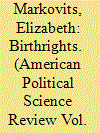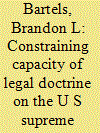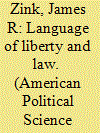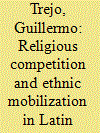|
|
|
Sort Order |
|
|
|
Items / Page
|
|
|
|
|
|
|
| Srl | Item |
| 1 |
ID:
090826


|
|
|
|
|
| Publication |
2009.
|
| Summary/Abstract |
Through an examination of Aeschylus' Oresteia, this essay argues for the critical importance of intergenerational justice to democratic theory. It explores the difficulties of democratic responsibility given the tension between necessity and freedom central to questions of intergenerational justice. The essay first details the relevant lacunae in the theories of two major figures of contemporary democratic theory, John Rawls and Jürgen Habermas. It then develops an account of democratic responsibility that acknowledges human freedom to make decisions, even given the necessity created by the fact that individuals and communities inherit their own range of potential actions from previous generations. The essay elaborates this claim by examining how each of the central figures in the Oresteia deals first with the dilemmas inherited from the past and then with new situations engendered by his or her own actions. The essay concludes with a consideration of this aspect of democracy in contemporary political life
|
|
|
|
|
|
|
|
|
|
|
|
|
|
|
|
| 2 |
ID:
090818


|
|
|
|
|
| Publication |
2009.
|
| Summary/Abstract |
Electoral campaigns are the foundation of democratic governance; yet scholarship on the content of campaign communications remains underdeveloped. In this paper, we advance research on U.S. congressional campaigns by integrating and extending extant theories of campaign communication. We test the resulting predictions with a novel dataset based on candidate Web sites over three election cycles. Unlike television advertisements or newspaper coverage, Web sites provide an unmediated, holistic, and representative portrait of campaigns. We find that incumbents and challengers differ across a broad range of behavior that reflects varying attitudes toward risk, that incumbents' strategies depend on the competitiveness of the race, and that candidates link negative campaigning to other aspects of their rhetorical strategies. Our efforts provide researchers with a basis for moving toward a more complete understanding of congressional campaigns.
|
|
|
|
|
|
|
|
|
|
|
|
|
|
|
|
| 3 |
ID:
090834


|
|
|
|
|
| Publication |
2009.
|
| Summary/Abstract |
Some European constitutions give cabinets great discretion to manage their own demise, whereas others limit their choices and insert the head of state into decisions about government termination. In this article, we map the tremendous variation in the constitutional rules that govern cabinet termination and test existing expectations about its effects on a government's survival and mode of termination. In doing so, we use the most extensive government survival data set available to date, the first to include East and West European governments. Our results demonstrate that constitutional constraints on governments and presidential influence on cabinet termination are much more common than has previously been understood and have powerful effects on the hazard profiles of governments. These results alter and improve the discipline's understanding of government termination and durability, and have implications for comparative work in a range of areas, including the survival and performance of democracies, electoral accountability, opportunistic election calling, and political business cycles.
|
|
|
|
|
|
|
|
|
|
|
|
|
|
|
|
| 4 |
ID:
090830


|
|
|
|
|
| Publication |
2009.
|
| Summary/Abstract |
Does law exhibit a significant constraint on Supreme Court justices' decisions? Although proponents of the attitudinal model argue that ideology predominantly influences justices' choices, "hybrid models" posit that law and ideology exhibit discrete and concurrent effects on justices' choices. I offer a new conceptualization of legal constraint examining how legal rules permit varying degrees of ideological discretion, which establishes how strongly ideological preferences will influence justices' votes. In examining the levels-of-scrutiny legal doctrine, I posit theoretical models highlighting the differential constraining capacities of the strict scrutiny, intermediate scrutiny, and rational basis rules. I use a multilevel modeling framework to test the hypotheses within the context of the Grayned doctrine in free expression law. The results show that strict scrutiny, which Grayned applied to content-based regulations of expression, significantly constrains ideological voting, whereas intermediate scrutiny (applied to content-neutral regulations) and the low scrutiny categories each promote high levels of ideological voting.
|
|
|
|
|
|
|
|
|
|
|
|
|
|
|
|
| 5 |
ID:
090819


|
|
|
|
|
| Publication |
2009.
|
| Summary/Abstract |
We study the effects of policy-specific public opinion on state adoption of policies affecting gays and lesbians, and the factors that condition this relationship. Using national surveys and advances in opinion estimation, we create new estimates of state-level support for eight policies, including civil unions and nondiscrimination laws. We differentiate between responsiveness to opinion and congruence with opinion majorities. We find a high degree of responsiveness, controlling for interest group pressure and the ideology of voters and elected officials. Policy salience strongly increases the influence of policy-specific opinion (directly and relative to general voter ideology). There is, however, a surprising amount of noncongruence-for some policies, even clear supermajority support seems insufficient for adoption. When noncongruent, policy tends to be more conservative than desired by voters; that is, there is little progay policy bias. We find little to no evidence that state political institutions affect policy responsiveness or congruence.
|
|
|
|
|
|
|
|
|
|
|
|
|
|
|
|
| 6 |
ID:
090827


|
|
|
|
|
| Publication |
2009.
|
| Summary/Abstract |
Although contemporary Americans take it for granted that a "constitution" is a written document, written constitutions were almost unprecedented at America's founding. James Wilson, one of the most significant yet overlooked of America's founders, offers a comprehensive theory of America's written constitution. Wilson argues that the written-ness of the U.S. Constitution serves two essential functions. As an initial matter, it memorializes the primacy of liberty by announcing that the authority of government derives only from a free people. Perhaps more importantly, however, the written constitution uplifts and refines the character of its citizens, and thus helps to constitute a people. A review of Wilson's writings and speeches reveals how, even in a rights-centric political order, the written constitution helps to cultivate moderate and civic-minded citizens without diminishing the fundamental importance of individual rights.
|
|
|
|
|
|
|
|
|
|
|
|
|
|
|
|
| 7 |
ID:
090828


|
|
|
|
|
| Publication |
2009.
|
| Summary/Abstract |
In his most practical work, the Laws, Plato combines a frank statement of the radical Socratic thesis that virtue is knowledge and vice involuntary with a prudential acceptance of the political community's need for retributive punishment. This paper examines the Laws' statements of principle regarding responsibility and punishment and compares these with the actual criminal code proposed in Book 9. The result is to show how a radical philosophic insight can be adapted to make ordinary citizens more gentle, thoughtful, and humane without sapping their moral commitments. Lessons are drawn from the Laws for the contemporary restorative justice movement.
|
|
|
|
|
|
|
|
|
|
|
|
|
|
|
|
| 8 |
ID:
090820


|
|
|
|
|
| Publication |
2009.
|
| Summary/Abstract |
Do voters effectively hold elected officials accountable for policy decisions? Using data on natural disasters, government spending, and election returns, we show that voters reward the incumbent presidential party for delivering disaster relief spending, but not for investing in disaster preparedness spending. These inconsistencies distort the incentives of public officials, leading the government to underinvest in disaster preparedness, thereby causing substantial public welfare losses. We estimate that $1 spent on preparedness is worth about $15 in terms of the future damage it mitigates. By estimating both the determinants of policy decisions and the consequences of those policies, we provide more complete evidence about citizen competence and government accountability.
|
|
|
|
|
|
|
|
|
|
|
|
|
|
|
|
| 9 |
ID:
090823


|
|
|
|
|
| Publication |
2009.
|
| Summary/Abstract |
Survey data regularly show that assessments of current and expected future economic performance are more positive when a respondent's partisanship matches that of the president. To determine if this is a survey artifact or something deeper, we investigate whether partisanship is associated with behavioral differences in economic decisions. We construct a new data set of county-level quarterly taxable sales to examine the effect of partisanship on consumption. Consumption change following a presidential election is correlated with a county's partisan complexion, a result consistent with partisans acting outside the domain of politics in accordance with the opinions they express in surveys. These results support an expansive view of the role of partisanship in mass politics and help validate surveys as a method for studying political behavior
|
|
|
|
|
|
|
|
|
|
|
|
|
|
|
|
| 10 |
ID:
090816


|
|
|
|
|
| Publication |
2009.
|
| Summary/Abstract |
This article suggests that a society's religious market structure can explain whether religion is "the opium of the people" or a major source of dissident secular mobilization. I present a simple model explaining why under monopolistic conditions, Catholic clergy in Latin America ignored the religious and social needs of poor rural indigenous parishioners but, when confronted by the expansion of U.S. mainline Protestantism, became major institutional promoters of rural indigenous causes. Catholic indigenous parishioners empowered by competition demanded the same benefits their Protestant neighbors were receiving: social services, ecclesiastic decentralization, and the practice of religion in their own language. Unable to decentralize ecclesiastic hierarchies, and facing a reputation deficit for having sided with rich and powerful elites for centuries, Catholic clergy stepped into the secular realm and became active promoters of indigenous movements and ethnic identities; they embraced the cause of the Indians as a member retention strategy and not in response to new doctrinal ideas emanating from Vatican II. Drawing on an original data set of indigenous mobilization in Mexico and on life histories and case studies, I provide quantitative and qualitative evidence of the causal effect of religious competition on the creation of the social bases for indigenous ethnic mobilization.
|
|
|
|
|
|
|
|
|
|
|
|
|
|
|
|
|
|
|
|
|